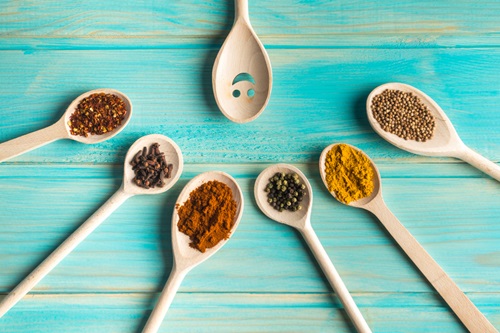Top 6 Anti-inflammatory Spice to Include in Your Diet
Spices are more than a secret ingredient that makes mouth-watering food, they are medicinal. Some spices contain anti-inflammatory compounds that may reduce inflammation. While there are fewer studies about their anti-inflammatory property, the relief is unmistakable.
What is Inflammation?
Inflammation is a physiological reaction to injury or illness. Inflammation is a normal body’s response to injury or infection (1). It occurs when the body releases chemicals that trigger an immune response to fight infection or heal the damaged tissue. Inflammation ends when the injury or infection is healed.
However, chronic or acute inflammation occurs when the inflammatory process doesn’t end. It is an abnormal immune response in which inflammation begins without an infection or injury. With time, this damages healthy tissues, cells and organs leading to heart disease, cancer, rheumatoid arthritis, asthma, and other autoimmune conditions (2).
There are two types of inflammation: acute and chronic inflammation. Symptoms for acute inflammation are;
- Flushed skin
- Swelling
- Heat
- Pain or tenderness.
Symptoms for chronic inflammation are;
- Abdominal pain
- Chest pain
- Fever
- Fatigue or insomnia
- Joint pain or stiffness
- Mouth sores
- Skin rash
- Depression, anxiety or other mood disorders
- Acid reflux
- Diarrhea or constipation
- Frequent infections
- Weight gain or loss (3).
Top Spices to Include in your Food and their Benefits
Did you know that what you eat may cause inflammation? Spices reduce acute and chronic inflammation because they contain anti-inflammatory compounds. Watching your diet helps prevent inflammation and the best way to ensure that is by spicing your meals with these nature’s goodies.
Turmeric
Turmeric (Curcuma longa) is a spice belonging to the ginger family. With its musky taste, this bright yellow rhizome contains curcumin, which may have anti-inflammatory compounds. Curcumin limits the production of molecules (cytokines) that cause inflammation (4). Research has shown that curcumin may reduce inflammation in the brain, which is connected to Alzheimer’s and depression (5).
Curcumin also reduces pain and swelling in people with arthritis. According to a John Hopkins study, combining curcumin and a chemotherapy drug was more effective at shrinking drug-resistant tumors (5).
Ginger
Ginger (zingiber officinale) has been a traditional medicine for generations to treat colds, migraines, nausea, arthritis, and high blood pressure. The active compounds in ginger might help reduce inflammation. Studies have shown that taking 1000 to 3000 mg of ginger daily over 4 to 12 weeks significantly reduced inflammation (6). Ginger also limits the production of cytokines and reduces joint and muscle pain.
Similar read;
Cinnamon
Cinnamon (Cinnamomum zeylanicum) is a popular spice from the bark of the cinnamon tree. It’s known for fighting inflammation. Cinnamon is rich in antioxidants. Did you know cinnamon is being researched for its potential to fight Alzheimer’s disease, and colon cancer, and decrease symptoms of irritable bowel syndrome because of its anti-inflammatory nature?
Garlic
Garlic (Allium sativum) contains anti-inflammatory compounds like allicin. Additionally, garlic enhances immune function and lowers blood pressure.
Cayenne Pepper
Cayenne pepper contains capsaicin, a compound that helps reduce inflammation. This compound reduces the number of pain signals sent to the brain. Capsaicin may also reduce arthritis pain when the cream is applied to joints and muscles.
Cloves
Cloves (Syzygium aromaticm) contain eugenol which reduces inflammation. Studies have shown that nutraceuticals from spices such as clove, garlic, ginger, pepper, and turmeric (among others) prevent and cure chronic diseases by targeting inflammatory pathways (7).
Meal Tips
Who says you don’t have to enjoy healthy food? Make your food tasty by using these spices in your cooking or drinks.
- Turmeric: Turmeric is popular in Indian cuisines, including American mustard and dill pickles. Serve this versatile ingredient in smoothies or soups because there are tons of ways to enjoy it. You can sprinkle on tacos, meat and roasted vegetables. Try turmeric tea and a squeeze of lemon or a splash of milk to make it tasty.
- Ginger: When it comes to cooking with ginger the possibilities are endless. Sprinkle some ginger powder or use the large chunks in your cooking. If you enjoy ginger smoothies try ginger tea. Experiment with your cooking, and add to baked goods, salad dressings or stir-fries.
- Cinnamon: Cinnamon is best when baking tasty treats or using it in oatmeal. Sprinkle it on hot cereal, yogurt or fruit. Use cinnamon in stews, and chillies. Aside from desserts, it’s used to flavor meat in many savory dishes including beef chili, Middle Eastern chicken shawarma, and Moroccan chicken.
- Cayenne pepper: Use cayenne pepper in hot sauces and marinades. Sprinkle it on your food, soups, stews, or meat to bring the heat to the table. This red, fiery spice adds a gutsy kick and elevates your dish.
- Garlic: Garlic can be used in dressings and roasted vegetables. Use garlic in soups and powdered garlic as a meat rub. Pair it with olive oil and rosemary to make a show-stopping meat rub.
- Black pepper: Salt and black pepper are like yin and yang, they go together so well. But it doesn’t have to stop from there, you can use pepper in your cooking. Try black pepper chicken, black pepper lavash as a side dish or black pepper soufflé.
- Cloves: Cloves can be used in savory foods, including drinks, desserts and spice blends. Try cloves with beef or venison, eggplant, and sweet vegetables. Cloves are an essential ingredient in warm punches or mulled wine.
Other Inflammation Reducing Foods
Fatty fish contain omega-3 fatty acids which help fight inflammation. Other foods that may reduce inflammation are:
- Nuts such as almonds and walnuts
- Olive oil
- Salmon and sardines
- Tuna
- Striped bass
- Anchovies
- High-fiber foods.
Use fresh spices whenever possible. For example, black pepper is more vibrant when freshly ground. Also, you can use them as supplements. Consult a healthcare professional before taking these compounds as supplements or spices for medicinal purposes.
Potential Side Effects
There are potential side effects with plants just like with any drug. Consult your healthcare provider for personalized care. It is best to discuss any remedies you may be using to get advice on drug interactions.
Awareness and consciousness sustain a healthy diet. Try meal planning to get the most out of the recipes and spices.
By: Monica Machera
Edited by: Damilola Elewa









Comments (0)